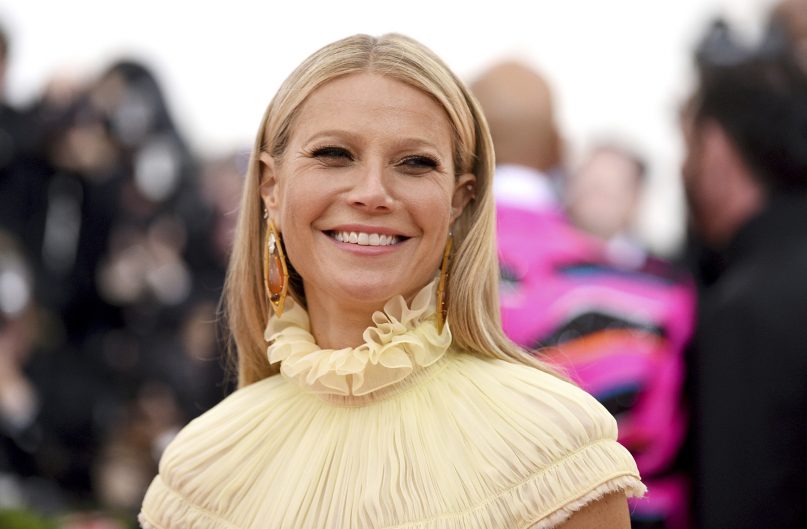(RNS) — In a testament to her sheer panache, Gwyneth Paltrow recently announced that her wellness empire, Goop, would sell a candle called “This Smells Like My Vagina.” There are times when an observer of this priestess of self-care is utterly helpless to do anything but go along.
Paltrow, like her musical analogue, Taylor Swift, has long existed at the border of self-seriousness and self-parody. A purveyor of jade eggs to put in your vagina and “sex dust” (not to put in your vagina), Goop has never pretended to scientific rigor. It’s a wellness brand, but also a full-time media troll, as much a commentary on impossible wealth and spurious purchases as it is a facilitator of those same purchases.
Unlike similar brands that commodify our spiritual yearnings, like SoulCycle or the candle company Rituals, Goop is able to exist apart from the question of whether anyone has ever actually bought any of its products. Does anybody actually have a yoni egg? Does the new down-there candle actually exist (or smell like what it purports)?
We’ll likely never know: The vagina candle appeared as sold out on Goop from the start, part of a carefully calculated marketing brand strategy. Goop products seem to be sold only to be sold out, and live on exclusively in the screens and inches of columnists like me. Goop is an ouroboros: It is only ever about Goopiness.
Goop’s vagina candle, in fact, puts the lie to the notion that Goop was ever about wellness. The company WW, formerly known as Weight Watchers and transformed in 2018 as part of that company’s rebrand toward personal growth and self-care journeys, is about wellness. The spa Mynd, formerly known as Elizabeth Arden’s glamorous Red Door, and now a purveyor of a “self-care journey you can confidently say is my,” is about wellness.
But Goop is about being so rich that you don’t even care. Goop is about utter disengagement — personal self-betterment that uses ridiculousness, not earnest attempts at bodily self-maximalization, to separate the truly #Blessed individual from the suspiciously serious masses.
The peons may use Zen Buddhist apps like Headspace to meditate on their way to work, but Goop exists in a world where nobody works at all. Absurdity isn’t just a fringe benefit of Goopiness, but rather the point: Melania Trump’s infamous “I really don’t care, do you” jacket made manifest in each and every one of the nonsensical items in Goop’s catalog.
None of this has anything to do with making yourself happier. Goop has nonetheless forced the real wellness to imitate its ethos.
In Joris-Karl Huysmans’ 1884 novel “À Rebours” (“Against Nature”), the protagonist — a neurasthenic and aristocratic aesthete named Des Esseintes — tries to create his life as a work of art. He retreats to a countryside estate and proceeds to decorate it in increasingly deranged ways. He encrusts a turtle with jewels, which promptly kills the turtle in question. He tries to dissociate himself from the normal biological impulses of a human being. (His last failed experiment is feeding himself purely through peptone enemas and trying to do away with consumption altogether.)
He does this not out of a quest for wellness, but rather an aesthetic, hyperironic desire to be original: to separate himself from the French bourgeois masses, la foule, who perform such dull and bourgeois activities as eating, sleeping and defecating. Des Esseintes, a dandy if there ever was one, has a horror of other people — a horror, too, of contingency, of being forced to do things simply because he is a human being in the world.
His obsession with art, with artifice and with absurdity are all at their core an obsession with disengagement: with the freedom that only irony provides.
Goop may have the illusory trappings of wellness, but ultimately its products function similarly. A vagina candle is less about actually improving your emotional or spiritual or physical well-being than it is about embracing the kind of disengagement, the gleeful out-of-touch-ness, that allows a person to spend $75 on a candle that smells like Gwyneth Paltrow’s vagina in the first place.
The fantasy Goop sells is the fantasy of being in on Goop’s joke. It’s a fantasy not of the body, well or otherwise, but of being included in its winking tribe of carefree souls. Like Des Esseintes’s gem-encrusted turtle, is a fantasy of irony-as-freedom, in contrast to the world of bodily need and contingency.
I choose to believe that there was never any vagina candle. Like any fantasy of total human freedom, it was nothing more than a fiction. But it’s a fiction to which, as long as Goop captures our collectively effervescent imaginations, we all continue to succumb.






